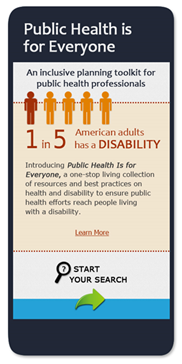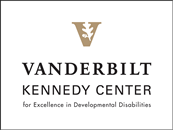|
Highlights from the Network
Six By '15 Campaign
 The Association of University Centers on Disabilities (AUCD) invites you to join the discussion about our new Six by'15 Campaign, which celebrates 25 years of the ADA and 40 years of IDEA. AUCD has worked with six partners to develop six goals which we hope to achieve by the end of 2015 to directly improve the lives of people with disabilities across the country. The Healthy Living goal (http://sixbyfifteen.org/six-goals-by-2015/healthy-living/) is: The Association of University Centers on Disabilities (AUCD) invites you to join the discussion about our new Six by'15 Campaign, which celebrates 25 years of the ADA and 40 years of IDEA. AUCD has worked with six partners to develop six goals which we hope to achieve by the end of 2015 to directly improve the lives of people with disabilities across the country. The Healthy Living goal (http://sixbyfifteen.org/six-goals-by-2015/healthy-living/) is:
At least six states commit to including people with disabilities as an explicit target population in all state public health programs.
Learn more and share your updates at Six by'15 Campaign.
From Six By '15 Healthy Living: White House Highlights Physical Fitness for People with Disabilities
 AUCD recently attended the Summit and Research Forum on Improved Health and Fitness for Americans with Disabilities. The event was co-sponsored by the President's Council on Fitness, Sports, and Nutrition and the National Institute of Child Health and Human Development and featured two members of CDC's Friends of NCBDDD, Jim Rimmer, PhD, principal investigator of the NIDRR-funded Rehabilitation Engineering Research Center on Interactive Technologies and Exercise Physiology Benefiting People with Disabilities (RecTech), and Amy Rauworth, the Director of Policy and Public Affairs at the Lakeshore Foundation and is the Associate Director of the National Center on Health, Physical Activity and Disability (NCHPAD). Success stories from the I Can Do It, You Can Do It! (ICDI) Program were shared, along with innovative approaches based on emerging research findings. With obesity rates being 38% higher for children with a disability, this school-based ICDI effort is critical to engage communities in inclusive physical activity. Team science, a way of learning from multiple disciplines, testing out strategies and implementing what is learned, was highlighted during the research discussion as a way to build relationships and develop methods. One of the key messages of the summit was that exercise is medicine for everyone, including people with a disability. To continue this discussion and increase inclusion of people with disabilities in health and fitness efforts, the Commit to Inclusion initiative was launched at the summit. To learn more, visit: committoinclusion.org. AUCD recently attended the Summit and Research Forum on Improved Health and Fitness for Americans with Disabilities. The event was co-sponsored by the President's Council on Fitness, Sports, and Nutrition and the National Institute of Child Health and Human Development and featured two members of CDC's Friends of NCBDDD, Jim Rimmer, PhD, principal investigator of the NIDRR-funded Rehabilitation Engineering Research Center on Interactive Technologies and Exercise Physiology Benefiting People with Disabilities (RecTech), and Amy Rauworth, the Director of Policy and Public Affairs at the Lakeshore Foundation and is the Associate Director of the National Center on Health, Physical Activity and Disability (NCHPAD). Success stories from the I Can Do It, You Can Do It! (ICDI) Program were shared, along with innovative approaches based on emerging research findings. With obesity rates being 38% higher for children with a disability, this school-based ICDI effort is critical to engage communities in inclusive physical activity. Team science, a way of learning from multiple disciplines, testing out strategies and implementing what is learned, was highlighted during the research discussion as a way to build relationships and develop methods. One of the key messages of the summit was that exercise is medicine for everyone, including people with a disability. To continue this discussion and increase inclusion of people with disabilities in health and fitness efforts, the Commit to Inclusion initiative was launched at the summit. To learn more, visit: committoinclusion.org.
Public Health is for Everyone
 Help create a public health network that integrates and supports people who have a disability. Please visit www.phetoolkit.org and submit your resources for including people who have a disability in public health efforts for inclusion in the toolkit. Public Health is for Everyone is a new, one-stop resource to increase the capacity of public health professionals to create programs that benefit entire communities, including people who have a disability. Users can search and browse disability and health related resources by their interests and professional needs. Resource topics include: Nutrition, Health care access, Physical activity, Emergency preparedness, Obesity, Accessibility, Tobacco, and general inclusion issues. Practical, hands-on resources such as field guides, factsheets, checklists, brochures and other tools are featured. To view, download, and share these resources, please visit www.phetoolkit.org. Help create a public health network that integrates and supports people who have a disability. Please visit www.phetoolkit.org and submit your resources for including people who have a disability in public health efforts for inclusion in the toolkit. Public Health is for Everyone is a new, one-stop resource to increase the capacity of public health professionals to create programs that benefit entire communities, including people who have a disability. Users can search and browse disability and health related resources by their interests and professional needs. Resource topics include: Nutrition, Health care access, Physical activity, Emergency preparedness, Obesity, Accessibility, Tobacco, and general inclusion issues. Practical, hands-on resources such as field guides, factsheets, checklists, brochures and other tools are featured. To view, download, and share these resources, please visit www.phetoolkit.org.
Do you have a practical free resource to share? Submit a resource to further develop Public Health is for Everyone. Do you know public health professionals who have resources for including people who have a disability in public health efforts? You can help to further develop Public Health is for Everyone by copying and pasting the above text into your organization's newsletter, so more professionals become aware of the toolkit. Just send an email to [email protected] to let us know where you shared information about Public Health is for Everyone.
Public Health is for Everyone is maintained by the Association of University Centers on Disabilities (AUCD) with support from CDC's Office for State, Tribal, Local and Territorial Support and the National Center on Birth Defects and Developmental Disabilities.
Increase Your Communication Knowledge and Skills with Communication Skills

Check out Communication Skills, a new resource module for early career professionals to use to increase communication knowledge and skills in the areas of:
Health care and wellness encounters with people with intellectual and developmental disabilities (I/DD);
Universal design in written and electronic communication;
Language use to demonstrate respect;
Supporting self-determination in health;
The use of technology to enable effective communication;
Communication with people with sensory challenges and language differences; and working with interpreters.
Communication Skills was developed by the Westchester Institute for Human Development University Center for Excellence in Developmental Disabilities, in collaboration with AUCD, with support from the HealthMeet Project of The Arc.
IDD Toolkit Offers Health Care Providers tools to better serve Adults with Intellectual and Developmental Disabilities
 This website provides best-practice tools and information regarding specific medical and behavioral concerns of adults with IDD, including resources for patients and families. The aim of this project is to equip primary care practices in the United States to care for adults with IDD as they transition from their pediatrician's care. The website's information is an adaptation for U.S. use of a Canadian book, Tools for the Primary Care of People with Developmental Disabilities, which is based on consensus guidelines and is peer-reviewed. The site has recently added a Health Watch Table for fetal alcohol spectrum disorders. The IDD Toolkit is a project of the Vanderbilt Kennedy Center (TN UCEDD/LEND) and the UT Boling Center (TN UCEDD/LEND) and the Tennessee Department of Intellectual and Developmental Disabilities, and was funded by the Special Hope Foundation. Please visit the toolkit at, http://www.iddtoolkit.org/. This website provides best-practice tools and information regarding specific medical and behavioral concerns of adults with IDD, including resources for patients and families. The aim of this project is to equip primary care practices in the United States to care for adults with IDD as they transition from their pediatrician's care. The website's information is an adaptation for U.S. use of a Canadian book, Tools for the Primary Care of People with Developmental Disabilities, which is based on consensus guidelines and is peer-reviewed. The site has recently added a Health Watch Table for fetal alcohol spectrum disorders. The IDD Toolkit is a project of the Vanderbilt Kennedy Center (TN UCEDD/LEND) and the UT Boling Center (TN UCEDD/LEND) and the Tennessee Department of Intellectual and Developmental Disabilities, and was funded by the Special Hope Foundation. Please visit the toolkit at, http://www.iddtoolkit.org/.
FDA's Office of Women's Health Releases a New Version of Using Medicines Wisely
 We are excited to announce that the FDA's Office of Women's Health now has a new version of Using Medicines Wisely for self-advocates and women with vision issues based on Association of University Centers on Disabilities (AUCD)-led discussion groups with women who have a disability. We are excited to announce that the FDA's Office of Women's Health now has a new version of Using Medicines Wisely for self-advocates and women with vision issues based on Association of University Centers on Disabilities (AUCD)-led discussion groups with women who have a disability.
Use Medicines Wisely, reviews important questions to ask health care professionals and other helpful tips. Now there are three new versions available:
- Use Medicines Wisely Large font version (PDF 192KB)
- Use Medicines Wisely Printable/Refreshable braille (PDF 21 KB)
- Use Medicines Wisely for women with intellectual disabilities and self-advocates (PDF 2,451 KB)
 AUCD Webinar resources: AUCD Webinar resources:
Check out these webinars to get updates from the FDA's Office of Women's Health, the Association of University Centers on Disabilities, and the Administration on Intellectual and Developmental Disabilities, on new materials and learn how you can play a role in October, "Talk About Prescriptions Month."
Using Medicines Wisely: Increasing Access to Information for Women with Intellectual Disabilities
Using Medicines Wisely: Increasing Access to Information for Women with Vision Issues
New Opportunities to Increase Health Insurance Enrollment of People with Disabilities

The National Disability Navigator Resource Collaborative (NDNRC), in collaboration with the American Association on Health and Disability, has announced funding for eleven Community Outreach Collaboratives (COCs). Each COC will increase collaborations and dissemination of outreach efforts to enroll people with disabilities in the Affordable Care Act. To find out information about each COC, including contact information, visit the NDNRC Web site.
|


